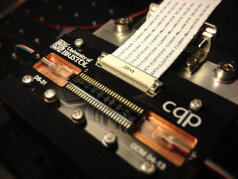Quantum computing is still in it infancy, but soon anyone with a Web browser will have access to an early form of this powerful computing technology. At the British Science Festival, Professor Jeremy O’Brien from the University of Bristol announced a ground-breaking project called Qcloud that aims to give everyone access to quantum computing via the Internet.
 Quantum computing is based on units of information known as qubits. These qubits exist in multiple states at the same time, a phenomenon known as superposition. The nature of qubits means that answers can be computed simultaneously. It’s an inherently parallel form of computing, and it’s thought to be exponentially faster than conventional computing, based on binary states (zeros and ones).
Quantum computing is based on units of information known as qubits. These qubits exist in multiple states at the same time, a phenomenon known as superposition. The nature of qubits means that answers can be computed simultaneously. It’s an inherently parallel form of computing, and it’s thought to be exponentially faster than conventional computing, based on binary states (zeros and ones).
The first commercial quantum computer was pioneered by Canadian firm D-Wave Systems. Early adopters of D-Wave machines include Lockheed Martin, the University of Southern California, NASA and Google. There is an on-going discussion over whether D-Wave’s technology should actually be considered quantum computing, but setting aside these arguments, the quantum systems that do exist have very limited access.
Scientists at the University of Bristol were concerned that current quantum technology was limited to so few users. They believe that to create a healthy ecosystem requires making the tools accessible to more people.
As of September 20, the quantum photonic processor housed at the Centre for Quantum Photonics at the University of Bristol will be available to researchers from anywhere in the world via remote access over the Internet.
Not everyone will get the chance to manipulate the quantum machine, not at first anyway. Initially, members of the public will be able to access a quantum simulator. (User guides and manuals help explain the basics.) Once the novice quantum coders have developed a working simulation, they can submit a proposal requesting that it be run on the real McCoy.
Project leader, Professor Jeremy O’Brien said: “This technology has helped accelerate our research and is allowing us to do things we never thought possible. It’s incredibly exciting to think what might be achieved by making this more widely accessible, not only to the brightest minds already working in research, but to the next generation. I hope that by helping schools to access this technology, and working with the British Science Association to provide educational content around quantum computing, we can achieve incredible things.”
The Qcloud computer is based on a silicon micro-chip, but instead of using electricity conducted on small wires it employs quantum states of light called photons. As the photons pass through the chip, they become entangled, meaning that actions performed on one effect the other.
With processor fab techniques nearing the limits of nanoscale and the most common encryption techniques coming under attack, quantum computing holds enormous appeal to researchers and government entities.
But don’t expect too much from these early systems. The version being used online only has two qubits. It’s no more powerful than a PC, noted project lead O’Brien. The University of Bristol researchers are working on 6- and 8-qubit versions, however those systems are still in development.
Interested in participating? The access point for the project is bristol.ac.uk/quantum-computing. The simulator is up and running now, and the actual quantum processors will be available for remote access starting Sept. 20.
A video of Jeremy O’Brien giving a TEDMED talk about the strange characteristics of quantum physics and the profound impact for several areas of health care.
Related Articles
D-Wave Two Quantum Computer Selected for New AI Initiative
Supercomputing Vet Champions Quantum Cause
Yale Scientists Move One Step Closer to Quantum Supercomputing
D-Wave Entangles with USC and Lockheed at New Quantum Computing Center




























































